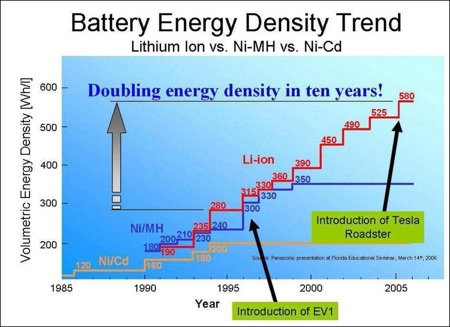mzso wrote:Andres125sx wrote:Nanoflow cell improved energy density of flow cells by a factor of 5, and they didn´t use Harry Potter for that


As any other battery techonolgy, energy density does improve, so please stop negating the obvious
Not it doesn't! Tell me how do you expect them improving energy density when it's just salt dissolved in water? Water dissolves whichever quantity it dissolves and not more. You expect magic it seems.
No, I´m expecting normal development, as with any other techonolgy
Flow batteries are far from simply salt dissolved in water as you stated

Some reading would help you
https://en.wikipedia.org/wiki/Flow_battery
mzso wrote:And you fancy believing energy density to just improve eternally for all battery technologies.
Manipulating my words again?
Where did I say eternally Sir?
Expecting development is very different to expecting eternal development, please don´t try to mock my arguments manipulating what I said

mzso wrote:They didn't improve anything. It's the energy density of this technology.
What technology? Redox? Zinc-polyiodide? Hybrid? Membraneless?
You need some reading before making such claims

mzso wrote:Andres125sx wrote:So they have some cars on the roads, they have a licence, but for you it´s not viable.
Research what the word "viable" means.
Apply yourself please
mzso wrote:Andres125sx wrote:It´s you who said that efficiency/consumption number is not impressive because it´s the same as Tesla model S. I only said the battery does not affect that number, as your statement looked like a critic to this technology, when this technology does not play a role on the number. What part you didn't understand?
Nope. I said "They noted 20 kWh/100 km, roughly the same as a Tesla Model S". That's not criticizing the value.
From some posts above...
mzso wrote:It's also not efficient. Not surprising with the use of fuel cells and low voltage.
They noted 20 kWh/100 km Roughly the same as a Tesla Model S.
You literally said "it´s also not efficient", and continued saying it´s the same as Model S, as if it wasn´t efficient, when it´s around 3 times more efficent than any ICE
Heck you´re contradicting yourself here, you´re saying fuel cells are not efficient, but then say its efficiency is similar to cars with Li-Ion batteries. How is that?
Anycase what need big improvement is energy density and easy of use (fast charging or battery replacing), efficiency of electric setups is really high despite your comments. EVs does need higher range, at least double than they do today, and that obviously cannot be achieved improving efficiency as it is well above 50% so you simply cannot expect to double efficiency. That´s the reason their 20Kwh/100km number is similar to model S, you cannot expect EVs to use significantly less energy as they´re already using most energy (high efficiency).
The only way to improve EVs is improving energy density of batteries, or using some sort of easily replaceable battery. Flow batteries go for the later, they´ve never claimed higher efficiency or higher energy density than Li-Ion batteries
Also, as flow batteries are not flamable, not toxic and harmless, they can use all nooks in a car to store the liquid, unlike Li-ion batteries wich can be flammable on an accident so they need to not be exposed and even so they need some rigid protection, so basically you can use more weight in liquid for flow batteries than you can use for Lithium based batteries, and also the liquid can be stored anywhere in the car so you can use a lot more volume without sacrifizing any useful space in the car


